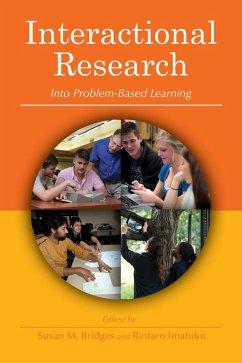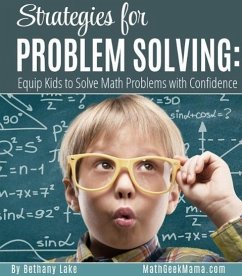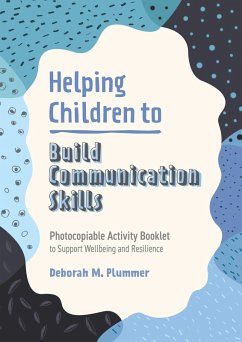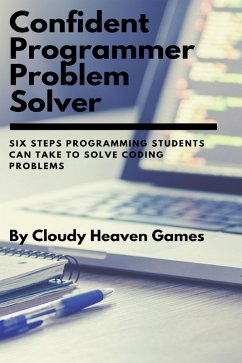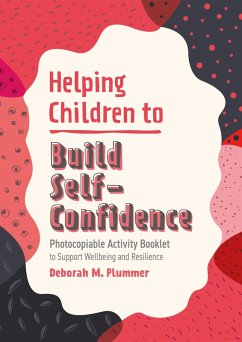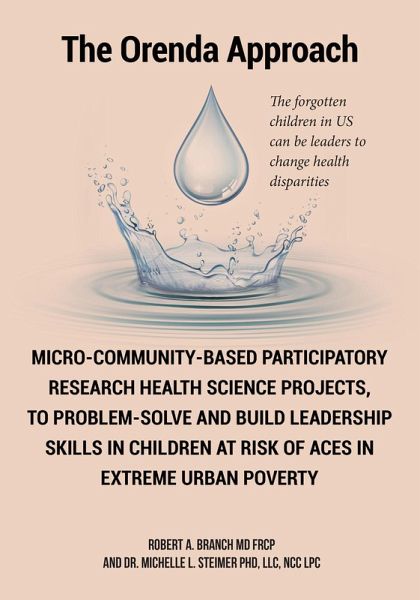
Micro-Community-Based Participatory Research Health Science Projects, to Problem-solve and Build Leadership skills in Children at risk of ACES in extreme Urban Poverty (eBook, ePUB)
The Orenda Approach
Versandkostenfrei!
Sofort per Download lieferbar
7,99 €
inkl. MwSt.
Weitere Ausgaben:

PAYBACK Punkte
4 °P sammeln!
The Orenda approach: We describe the foundational base and health and education process to interface science and health learning for vulnerable adolescents, who live in extreme urban poverty in the US, 'the forgotten children', to manage emotional and social barriers at this critical stage of their lives. These children live in neighborhoods concentrated with dysfunctional families many with Adverse Childhood Experiences (ACEs). They are at risk for complications of personal and environmental factors while still adolescents. They lack the opportunity to build resilience and leadership to overc...
The Orenda approach: We describe the foundational base and health and education process to interface science and health learning for vulnerable adolescents, who live in extreme urban poverty in the US, 'the forgotten children', to manage emotional and social barriers at this critical stage of their lives. These children live in neighborhoods concentrated with dysfunctional families many with Adverse Childhood Experiences (ACEs). They are at risk for complications of personal and environmental factors while still adolescents. They lack the opportunity to build resilience and leadership to overcome these challenges. We integrate experiential learning approaches between contemporary physician health and K-12 science learning pedagogy to emphasize the value of science to a community. Our experiences are presented of challenges faced and barriers overcome over 4-years in over 100 adolescents in different extreme neighborhoods of poverty in the rust belt city of Pittsburgh.
Mission: 1. To experience the social skills in an ethical framework for critical thinking and leadership by conducting successful community research in forgotten children. 2. To improve the local culture of health care to reduce health disparities in underserved neighborhoods.
The Orenda Approach, An Iroquois adjective, denotes the goal of developing leadership in adolescents. The approach is by organizing health sciences clubs for at-risk adolescents as an after-school activity with trained mentors. Small teams select and identify locally relevant health disparities micro-Community-Based Participatory Research (mCBPR) projects. Using the 5 steps of mCBPR scientific process. with a mantra of 'learn, decide and do' at each step, they conduct a wide range of practices to extend skills promoted by STEM disciplines by adding arts and science as STREAM learning, The mCBPR projects are used to draw inferences and present recommendations to reduce barriers posed by the local community. Fitted into an academic school year in weekly OST club meetings with an end-of-academic-year, the results are shared in a local community health fair.
Long term objectives: We offer a model for a city-wide network of clubs, targeted to the most underserved neighborhoods, as an approach to improve city-wide health equity. If sustained. This could contribute multiple topics for a cumulative increased awareness to enhance the local culture of health. Without help, these forgotten children are destined to the local cycle of failure; a societal lost opportunity. With help, each year a cohort of students would be trained in problem-solving as an increased societal opportunity as community leaders for the future.
Mission: 1. To experience the social skills in an ethical framework for critical thinking and leadership by conducting successful community research in forgotten children. 2. To improve the local culture of health care to reduce health disparities in underserved neighborhoods.
The Orenda Approach, An Iroquois adjective, denotes the goal of developing leadership in adolescents. The approach is by organizing health sciences clubs for at-risk adolescents as an after-school activity with trained mentors. Small teams select and identify locally relevant health disparities micro-Community-Based Participatory Research (mCBPR) projects. Using the 5 steps of mCBPR scientific process. with a mantra of 'learn, decide and do' at each step, they conduct a wide range of practices to extend skills promoted by STEM disciplines by adding arts and science as STREAM learning, The mCBPR projects are used to draw inferences and present recommendations to reduce barriers posed by the local community. Fitted into an academic school year in weekly OST club meetings with an end-of-academic-year, the results are shared in a local community health fair.
Long term objectives: We offer a model for a city-wide network of clubs, targeted to the most underserved neighborhoods, as an approach to improve city-wide health equity. If sustained. This could contribute multiple topics for a cumulative increased awareness to enhance the local culture of health. Without help, these forgotten children are destined to the local cycle of failure; a societal lost opportunity. With help, each year a cohort of students would be trained in problem-solving as an increased societal opportunity as community leaders for the future.
Dieser Download kann aus rechtlichen Gründen nur mit Rechnungsadresse in A, D ausgeliefert werden.






